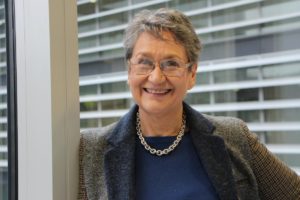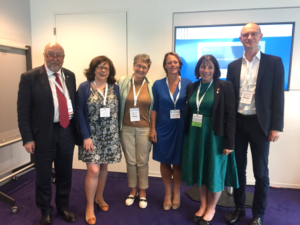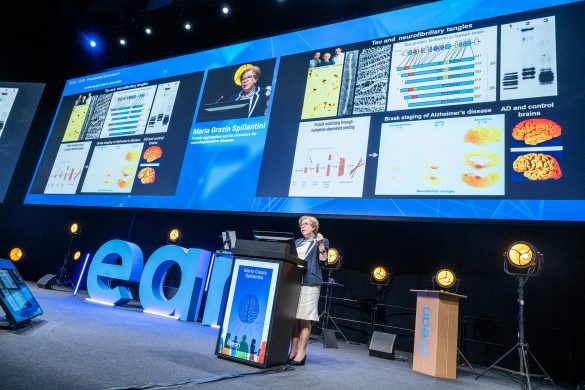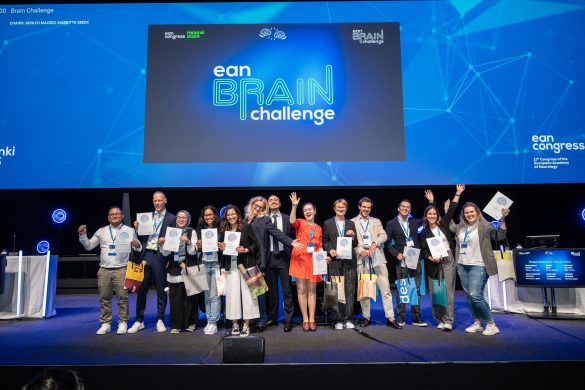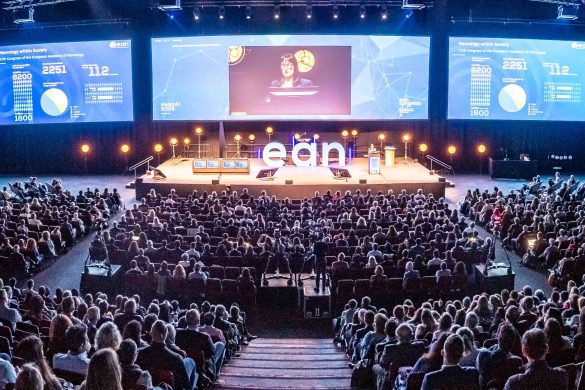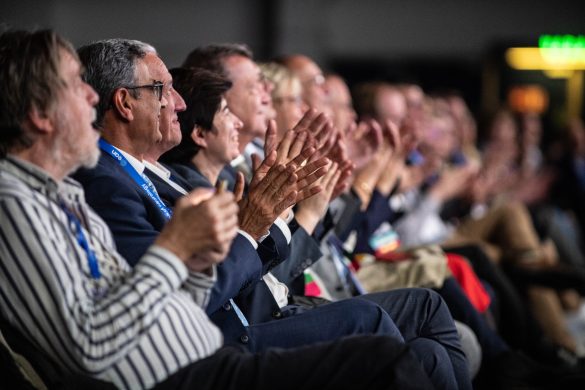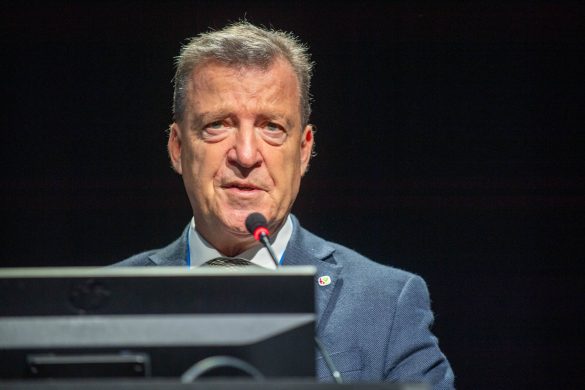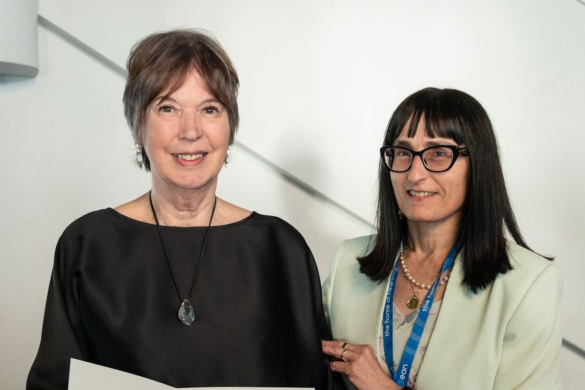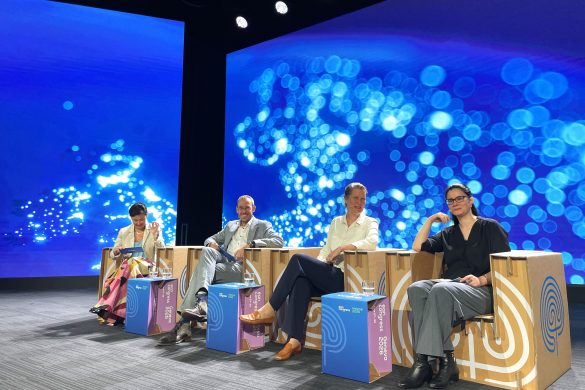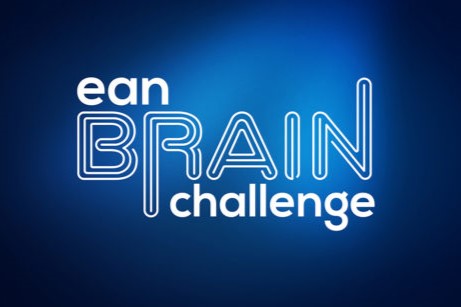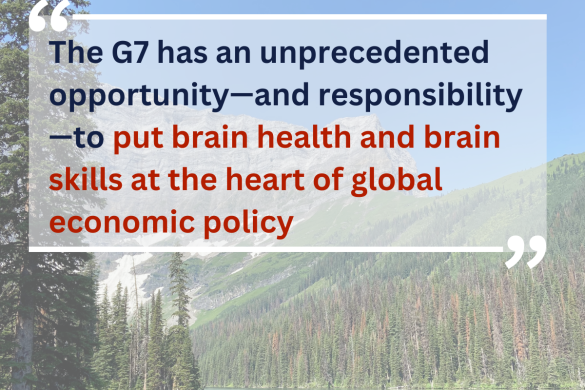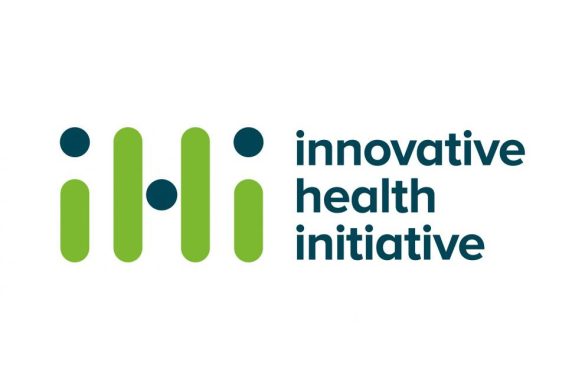Segolene Aymé
Founder and past director of Orphanet
http://www.orpha.net/consor/cgi-bin/index.php?lng=EN
Antonio Federico (AF): Dear Professor, you founded Orphanet and gave a great contribution on the development of information about Rare Diseases in Europe. Can you summarize your past activities and the difficulties you had?
Segolene Aymé (SA): That is a long story as I started to build a database of genetic diseases and of malformation syndromes described in the literature, in the mid-seventies, when I started as a clinician in medical genetics, lost in diagnosing most of the patients attending our clinic in Marseilles. With an algorithm based on belief functions, I used it to compare the patients without a diagnosis with patients described in the International literature; but there was no way to share facility outside my hospital. In the early nineties, I started another database of expert clinicians dedicated specifically to rare diseases, of expert clinical laboratories providing diagnostic tests, and of expert research teams working on rare diseases. This was to help researchers to liaise with clinicians to access large families with genetic diseases, a necessary step to map the human genome. The database was accessible through a quarterly report sent by regular mail to professionals. When Internet arrived, suddenly it became thinkable to share all these resources with the community at large. In 1996, Orphanet was born, first in French exclusively as it was the merge of the two already existing database, then in English in 2001 when a grant from the European Commission opened new opportunities, and now in seven languages. The obstacles that I faced first was the resistance of many experts to make medical information available to non-experts, especially to patients. They were afraid that patients would stop consulting them, that non-expert MD would stop referring their patients to appropriate clinics. Of course, this did not happen, as what you release is information in general, not enough applicable to specific personal situations. The second difficulty was to build a knowledge database of thousands of diseases from all medical fields. It has been very difficult to make several specialties work together. However, the main issue was to find the resources to document so many diseases at a period when the knowledge was evolving fast. During the first decade of Orphanet, we felt like we had to do everything by ourselves, as no one else was interested; but since, the interest for rare diseases grew up very quickly, so that many specialized groups started to produce excellent information packages. The focus of Orphanet shifted to the aggregation of content. An additional challenge was to impose an International nomenclature, by providing an inventory of rare diseases and classifications of these diseases, to ensure that tools are available to make interoperable datasets. We succeeded by making freely accessible our inventory and all data elements linked to it, on orphadata.org. The success was immediate, with thousands of downloads from the first month on. Since, the virtuous circle of collaboration with all stakeholders and of rigorous standing operating procedures has done the rest. Orphanet is now the International standard. What remains complicated is to sustain the budget of this infrastructure, as most grants are for short-term projects, not for long-term ones.
AF: Rare Neurologic Diseases are one of the most common conditions within the Rare Diseases. What is your feeling about the knowledge of general neurologists about rare neurologic diseases and what you suggest that EAN may do for improving it in the future?
SA: If we include the neurodevelopmental disorders into the neurology category, neurology is the third area in terms of number of rare diseases, after developmental defects (malformation syndromes) and oncology. I don’t know whether the level of ignorance of neurologists is greater or not, compared to other medical specialties, but I suppose it is similar, which means unfortunately great. This is normal, as these diseases are not taught at medical school. I suggest that the EAN produce a list of rare diseases in Neurology, using the Orphanet data, targeted to adult neurologists, and another one targeted to pediatric neurologists, and post it on its website as a PDF document. This document would also give information on the main resources: Orphanet and the ERN in neurology. It would be also useful to offer training sessions at the EAN congress. I would be happy to help developing these new services.
AF: Do you consider that all European Countries have developed the same interest on the Rare Neurologic Diseases or there are differences and if yes, what the EAN can do to promote the interest in those countries?
SA: Not all European countries have the same interest in developing solutions for rare diseases, despite all efforts to inspire the less motivated countries. The fists countries to understand that rare disease require a specific organization of the healthcare system and that patient organizations have to be involved in policy development were the Scandinavian countries, specifically Denmark and Sweden. France is the first and unique country, which adopted a national plan in 2004, covering both care provision and research, and with a significant specific budget. It is still the only country with networks of expert centers covering all rare diseases. Since, most countries, except Estonia, Malta, Luxembourg and Poland, have adopted a plan or a strategy, but not backed up by a dedicated budget. The focus is more on research in Germany, more on patient data in Italy, more on expert centers in England but only for a subset of rare diseases… What is done is very heterogeneous. At least every European country contribute to Orphanet…The differences are also major regarding access to sequencing technologies for diagnosis, and access to orphan drugs; partly because of the differences in the healthcare system organization and wealth status of the country, but also because of the level of interest for rare diseases. In neurology, the composition of the European Reference Network is uneven across countries with 25 participating centers from 14 countries only.
AF: What is the best success you obtained in your life working with rare diseases and what you were not able to obtain?
SA: I am globally proud and happy to have contributed to provide solutions to patients with genetic or rare diseases, something that I decided to achieve when I was 25. I believe I had a decisive contribution to the field through the inventory of rare diseases and the classifications attached to it, which was decisive in convincing WHO to incorporate rare diseases in the next edition of the International Classification of Diseases, ICD11. I have also decisively contributed to the definition of the French policy in the field, and of the European policy, as chair of the Rare Disease Task Force of the European Commission. I am also proud of the journal I founded, the Orphanet Journal of Rare Diseases, and of the Orphanet website, adopted by 42 countries as the way to disseminate information to professionals and patients. Rare Diseases are now under the spotlights, it is what matters. What I have not been able to put in place is a better access to patient data, although I tried hard through the European Committee of Experts on Rare Diseases of the European Union (EUCERD). By definition, data is scarce, that means precious. It is not acceptable that many datasets are not made available to third parties able to analyze them, are not shared between Academia, Patient organization, health authorities and Industry. Every registry, every cohort, should be a common good, respecting the FAIR principles: Findable, Accessible, Interoperable, Reusable. The resistance is more psychologic than technical.
AF: Do you think that the EU is moving correctly in the field and in what you would like that it will improve?
SA: The EU has done a lot already, providing that Health falls outside the Treaties. That means that the European Commission cannot do anything except organize the cooperation between European countries. In 1999, the EU adopted an orphan drug regulation, which has had a decisive effect on the development of medicinal products for rare diseases. In 2000, rare diseases became a priority area, both for research funding and for Public health funding. In 2007, a rare disease task force was established and funded, which became later the EUCERD composed of representatives of the health authorities of every European country, of patient organizations, of academic organizations, and of representatives of the EC services. This committee has produced many recommendations to drive and support the development of appropriate policies at country level. In 2012, the European Commission took the initiative to launch an International Rare Diseases Research Consortium with the NIH, the IRDiRC. It is now a well-established network of research funding agencies from many continents, pushing forward the agenda of rare diseases and convincing the community to be more collaborative than competitive. In 2016, the European Commission opened a call to select European Reference Networks of Expert Centers. Although these ERNs were not specifically designed for rare diseases, at the end, 22 of the 23 first designated ERNs are for rare diseases. The European Union did its job; the rest has to be done at country level….
AF: Are you satisfied with the orphan drug landscape? What do you think about the prices of Orphan drugs? Is it always justified?
SA: I have very mixed feelings about the orphan drug landscape. The translation of rare disease research into product development is happening across an increasing number of diseases, thanks to the Orphan Drug regulation, and to the advancement of science in general. If Oncology remains the most common therapeutic area, it is immediately followed by neurology. Unfortunately, R&D develops in clusters, which means that very few new products are developed for a totally orphan disease. Most companies invest in areas were the R&D ecosystem is already well in place. Orphan drugs prices are higher than non-orphan drugs, and the rational for that is unclear to say the least. It is understandable that small market size induces automatically higher prices per patient, but what is seen, years after year, is a constant increase of the prices, with no clear correlation with the market size nor the complexity of the production or the length of the development phase. This is hard to justify in an area with high level of unmet needs. Moreover, this is not sustainable. The orphan drugs’ share of the total pharmaceutical market was predicted to peak from 3.3% in 2010 to 4–5% in 2020. Most health care budgets will not cope with that. We are in a very frustrating phase: science is delivering, patients are pushing and contributing, incentives are in place to support Industry, but companies still try to obtain unfair benefits. The worse would be to have to give up the development of promising products, just for financial reasons. It is time to impose transparency in the way prices are established.
Segolene Ayme, in the center, at Amsterdam EAN Congress, with (from the left) Prof. Federico, the Coordinators of the 4 Neurologic related ERNs (NMD-ERN, Segolene Ayme, Metab-ERN, Epicare ERN, RND-ERN), after the Meeting of the TF of Rare Neurologic Diseases
by Antonio Federico, Chair EAN Scientific Committee

